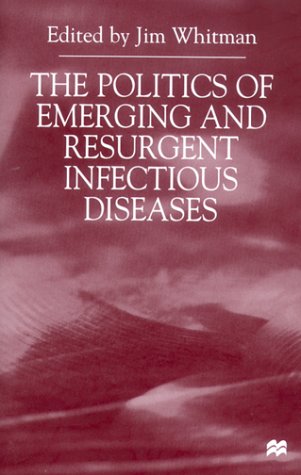Items related to The Politics of Emerging and Resurgent Infectious Diseases

"synopsis" may belong to another edition of this title.
Since the late 1980s, a few powerful voices, notably that of Joshua Lederberg, have warned of an approaching meltdown in the apparently successful, modern disease-control regimens that have delivered unprecedented reductions in mortality and morbidity in the developed world. In 1994, science writer Laurie Garrett published The Coming Plague (New York: Farrar Straus and Giroux), which highlighted these concerns for a popular audience and drew the problem of emerging infections into the public domain. Television and radio documentaries have since picked up on the frisson value of this topic, but most of the discussion has taken place in specialty journals rather than in the public arena.
The Politics of Emerging and Resurgent Infectious Diseases, a collection of essays edited by Jim Whitman of the Peace Studies Department at Bradford University in the United Kingdom, may help move the subject closer to debate in the chambers of policymakers and politicians. The origins of this collection in a department of peace studies may seem mysterious, but that discipline now encompasses far more than the study of war and its counterpart, since it is centrally concerned with human security. By all informed estimations, the potential threat of infectious diseases to the security of human life and modern society is now immense, and it is this threat that constitutes the unifying theme of this book.
Twelve essays are cleverly dovetailed and arranged to lead the reader on an intriguing, if somewhat disheartening, path of discovery. Many of the issues raised here were presented by Garrett in 1994, wrapped in vivid stories of the epidemiologists and microbiologists at the frontiers of disease surveillance and control. The impact of Garrett's work came in part from the brilliance of her storytelling; Whitman and his colleagues offer a less colorful, lower-key analysis that nonetheless builds a convincing argument for the primacy of politics as a factor in generating epidemics and in the success of any endeavor to avert epidemic catastrophes.
Viewed from any perspective, the 20th century was a period in which political considerations disrupted human security on a scale that far outstripped that of any previous era. Warfare assumed a global reach during the periods from 1914 to 1918 and from 1939 to 1945, and with the rise of the international arms trade and of political and ethnic consciousness, it escalated in unpleasantness. Above all, warfare in the 20th century meant wholesale social dislocations, with refugees and emigrants spreading out from their homelands across the countries of the world. Twentieth-century technology permitted immense development schemes, often with political rationales, which added to this dislocation. Unregulated urbanization led to the creation of megacities, most of whose inhabitants live in overcrowded conditions of utter squalor. Dislocation, migration, desperate lack of sanitation: all are politically created, and all provide ample opportunity for infectious diseases again to take hold and add their measure of devastation.
Against this background, the contributors to Whitman's book mostly explore the specific political factors that complicate modern responses to current and potential epidemic emergencies. One of the major obstacles to the resolution of conflicts, for example, is the United Nations Charter, with its ``almost sacred notion of national sovereignty,'' which inhibits observer nations from intervening in other countries' internal disasters. Existing international law on infectious-disease emergencies is far from adequate, and developed nations are shortsightedly concerned only with their own internal welfare.
The World Health Organization, long a prestigious and influential force in world politics, is suffering a double crisis of credibility and funding. There are also ominous developments in political culture. Renee Danziger, for example, highlights the rise in the West of a ``neoliberal democratic ideology'' that elevates the rights and interests of individuals above those of the community as a whole. As a result, national policies toward human immunodeficiency virus infection and AIDS have generally avoided collective and compulsory measures in favor of individual autonomy and personal choice with regard to testing, treatment, and individual behavior. With the emergence of other lethal, chronic infections, notably drug-resistant tuberculosis (the politics of whose control are admirably discussed here by Kraig Klaudt), the elevation of individual above community rights can only pose an increasing problem for infectious-disease control in the West.
The principal focus of this book lies, rightly, on the political structures and cultures of the developed world that created this hazardous situation and that alone have the power, if perhaps not the will, to initiate effective preventive measures. The strength of the book lies in its sober presentation and assessment of a political picture that spans the developing and the developed worlds and in its avoidance of rhetoric and emotional examples. The prose style is uniform and rather flat but serves a purpose in engendering serious reflection rather than fanning the flames of alarm.
Anne Hardy, D.Phil.
Copyright © 2001 Massachusetts Medical Society. All rights reserved. The New England Journal of Medicine is a registered trademark of the MMS.
"About this title" may belong to another edition of this title.
- PublisherPalgrave Macmillan
- Publication date2000
- ISBN 10 0312228546
- ISBN 13 9780312228545
- BindingHardcover
- Number of pages223
- EditorJim Whitman
Shipping:
US$ 3.75
Within U.S.A.
Top Search Results from the AbeBooks Marketplace
The Politics of Emerging and Resurgent Infectious Diseases
Book Description Hardcover. Condition: Good. Connecting readers with great books since 1972! Used textbooks may not include companion materials such as access codes, etc. May have some wear or writing/highlighting. We ship orders daily and Customer Service is our top priority!. Seller Inventory # S_242897282
The Politics of Emerging and Resurgent Infectious Diseases
Book Description Cloth. Condition: Very Good. Dust Jacket Condition: Very Good. 1Sticker and stamp on front endpaper. Price sticker on dust jacket. Seller Inventory # 1104193

